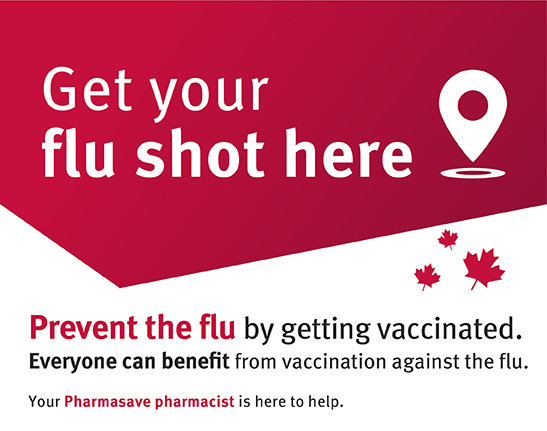
October – Cold & Flu
The at-risk flu patient: what you can do
Everyone is at risk for getting the flu. However, there is a group of people who are at higher risk for serious complications and severe infection. This group includes:
- young children under 5 years old (especially if they are less than 2 years old)
- adults over 65 years old
- pregnant women (especially if they are in their second or third trimester) and women who were recently pregnant (within the last 6 weeks; either having given birth or who recently had a miscarriage within that timeframe)
- people with underlying medical conditions, including people with:
- asthma and other chronic lung diseases (e.g., chronic obstructive pulmonary disease (COPD), cystic fibrosis)
- diabetes
- heart disease (e.g., coronary artery disease, congestive heart failure, congenital heart disease)
- chronic liver or kidney disease
- a weakened immune system (immunocompromised). The immune system can be weakened by:
- HIV/AIDS, an infection that attacks the immune system
- cancer
- medications for certain conditions, such as:
- organ transplants: e.g., steroids, medications that suppress the immune system to prevent it from rejecting the organ (e.g., cyclosporine, tacrolimus, mycophenolate mofetil)
- cancer: e.g., chemotherapy
- certain types of arthritis, such as rheumatoid arthritis: e.g., steroids, biologics (medications that modify the response of the immune system, such as adalimumab or infliximab), medications that suppress the immune system to prevent it from attacking the body (e.g., methotrexate, azathioprine)
- Crohn’s disease: e.g., steroids, biologics (see above), or medications to suppress the immune system
- blood disorders (e.g., anemia, sickle cell anemia)
- neurologic and neurodevelopmental disorders that affect their ability to swallow and breathe
- obesity
- people younger than 19 years old who are taking long-term acetylsalicylic acid (ASA) therapy (e.g., children who have Kawasaki disease)
This group of people are also more likely to be hospitalized with the flu.
Are you at risk for flu complications? If you fall into this category of people, there are a few steps you can take to protect yourself from the flu.
Avoid contact. The first step is to stay away from anyone who has any flu-like symptoms and to keep away for at least 24 hours after the person’s fever ends. This may mean staying away from your doctor’s office for non-urgent appointments during the flu season or avoiding situations where crowds occur.
Maintain strict hygiene. Washing your hands frequently is one of the simplest methods of reducing the spread of the flu virus. Proper hand-washing means washing with soap and water for at least 20 seconds. Alcohol-based sanitizers with at least 60% alcohol by volume can be used when soap and water are not available and when hands are not visibly dirty.
Stay healthy. Eat nutritious, healthy meals and exercise regularly to keep your immune system strong.
Manage your medical condition. If you are at risk of flu complications because you have a chronic medical condition, make sure you are managing it as well as possible. Take all medications and follow all treatment options as prescribed. Your doctor may also recommend you get vaccines against certain diseases, such as flu or pneumonia. Make regular appointments as recommended by your doctor. If you are taking medications, make sure you have at least a 2-week supply at home so that you don’t have to leave the house to get more. Ask your pharmacy if they have a delivery service.
Despite all these measures, it is still a possibility for you to get the flu. If you do get symptoms of the flu, see your doctor as soon as possible. Do not wait until your symptoms get worse. People at risk for flu complications should see their doctor as soon as they notice symptoms so that they can get treated – early treatment can reduce the risk of complications.
Ask Your Pharmacist
Question: I already got my two doses of COVID-19 vaccine, do I still need to get my flu shot?
A: Yes, it is still important to get your flu shot even if you already received your COVID-19 vaccinations. The influenza vaccine provides different protection than the COVID-19 vaccination. The best way to protect yourself and your loved ones is by getting vaccinated every year. Health Canada recommends that everyone 6 months and older should get the annual flu vaccine as soon as it’s available. Getting the COVID-19 vaccination does not affect the benefits of protection from the flu shot. However, if you recently received your first or second dose of COVID-19 vaccine, you want to make sure you wait at least 14 days before receiving your flu shot.
Have more questions? Ask your Pharmasave pharmacist.
Health Tip
It’s important to keep up to date with your adult immunizations. It’s not just the influenza vaccine or COVID-19 vaccine you need to get as an adult. Don’t forget about tetanus and diphtheria, shingles, Measles Mumps and Rubella, etc. Keep in mind that if you recently received your COVID-19 vaccine, there is a period of time you need to wait before getting other vaccinations and vice versa. Speak to your pharmacist about what type of vaccinations you need, when you can schedule an appointment for them and if you can get multiple vaccinations during the same appointment.



